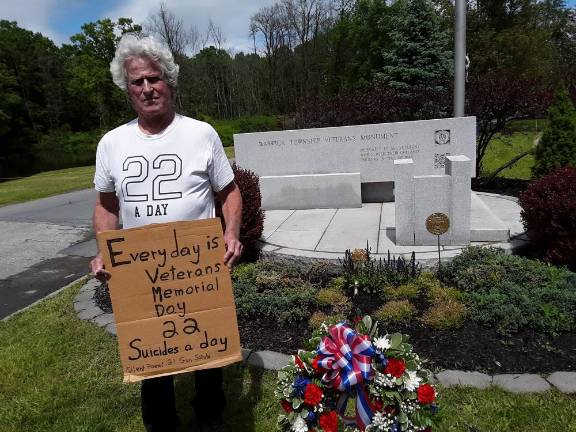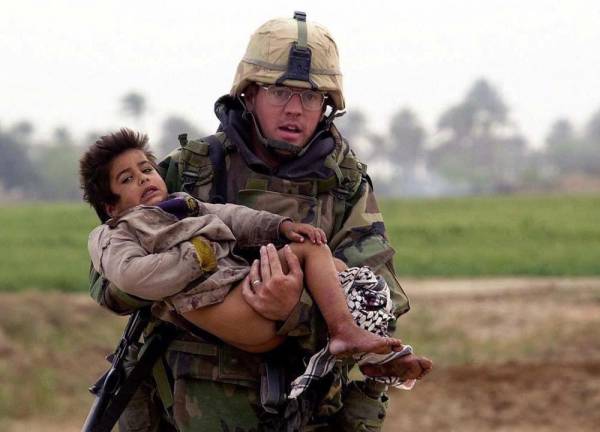‘They’re facing their mortality, my generation’
In offering an ear to troubled vets, a retired house painter comes to terms with his own haunting Vietnam experience


I never imagined that lonely old vets – from WWII, Korea, Vietnam – or their caregivers would hold my hand while crying and call me their angel. When I started working for the Dwyer program, I did not know that my war experience or suicide attempts would give vets the freedom to speak about their war experiences or suicidal thoughts. I did not know there were so many homeless and hungry vets in Orange County. I did not know the need for Vet2Vet would be so great or that it would change my life so much.
The Joseph P. Dwyer Veteran Peer Support Program was started by the New York State Senate in 2012. Joseph Dwyer was an Army combat medic who served heroically in Iraq. He never believed it about himself. He died of an overdose. The program came to Orange County in 2014. That’s when I was hired: a house painter on the doorstep of retirement, a Vietnam vet who, for more than 40 years, could not talk about it.
I know a lot of Vietnam vets, they wear it on trucks and flags. I could never identify with that. I did not have a sense of pride in my service. I denied it, avoided it, rejected it – until I started working with vets like me who had their own doubts, shame, guilt, remorse, things like that. And so I can speak to a vet about my experience and that allows them to speak about theirs.
I learned about homelessness from vets. Teenage boys will push you off the sidewalk into on-coming cars, one told me. They will come into your camp, steal what they want, trash the rest and shoot BB guns at you. Most of this vet’s scar was on his back, some on his stomach. “Incendiary grenade,” he said. “Helluva war, nobody remembers it.” So much sorrow in his life, alongside constant fear, constant cold, constant hunger. So much sorrow being a Marine.
“It’s a terrible thing to kill another human being,” said another vet. For him it was World War II, Pacific islands. He had performed “mopping up” on Saipan after the initial assault. The Japanese were dug deep into caves. He used a flame thrower, burning humans alive. “I have two daughters,” he said. “They both hate me and wish I was dead.” He held my hand and cried.
A lot of veterans have broken family lives: two or more divorces, children who won’t speak with them, grandchildren they’ve never seen, maybe a history of alcoholism or domestic violence. They may be lonely, isolated, angry, and I listen. My job is to assist veterans in any way that I can: set them up with food if they’re hungry, with housing if they’re homeless, with transportation if they’re not driving, help with food shopping or getting a new ID or a cell phone. Mostly, though, I just offer my ears.
I listen very carefully, try to understand what’s going on with them, very often they’ll complain about one thing but it’s really something else that’s going on. They’re facing their mortality, my generation. They’re facing all the mistakes they’ve made in their lives and they don’t quite know what to do with it.
I spoke with the World War II vet’s daughters. “We both hate him and wish he was dead,” one daughter said, echoing her father. He had never once spoken to his daughters about his war. After his death, the younger of his daughters said, “I hope I can stop hating him before I die.” It’s called the war after the war.
I’ve heard a hundred stories from a hundred women vets about their military rapes – and from men, too. “I believe every woman in my class and every class after me was raped,” one of the first women cadets at West Point told me at a veterans retreat. Said another, “I was raped at every duty station. I was raped so many times I became a slut.”
That so many women will talk to me about a rape is extraordinary. Sometimes it’s horrible details. My job in some sense is to develop trust. It may take months, it may take years.
From the start, I facilitated Warrior Writers workshops at different locations. I remember an angry WWII vet. It was just the two of us. “I want to write,” he said, “but can’t get started.” That’s your prompt, I said, why I want to write. He had brought a yellow legal pad. His pen did not stop moving. He filled a page, pointed at it. “This is not why I want to write,” he said. He filled another page. Said the same. Then a third. He pointed and said, “This is why I want to write.” After the war, he had become a mathematician, a professor. “Numbers,” he said, “don’t lie. War is all about lies.”
Vet2Vet is healing for warrior souls, whether a 20-year-old returning from Afghanistan or a 90-year-old grieving for Hiroshima. We were all trained to kill. There is a lifetime of consequences for that experience.